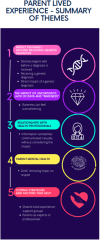Identifying the Impacts, Obstacles and Information Barriers for Parents of Children Living With Genetic Neurodevelopmental Disorders: A Qualitative Study
- PMID: 40607502
- PMCID: PMC12223786
- DOI: 10.1111/hex.70340
Identifying the Impacts, Obstacles and Information Barriers for Parents of Children Living With Genetic Neurodevelopmental Disorders: A Qualitative Study
Abstract
Background: A genetic neurodevelopmental disorder (GND) impacts all aspects of a child's and family's life. GNDs are rare; most have limited natural history data. We aimed to understand the impacts, obstacles, information barriers and coping strategies developed through parents' experience of receiving and living with a child's diagnosis.
Design and participants: This analysis is part of the UK multicentre observational study of children with rare GNDs (GenROC). We conducted 17 semi-structured online interviews with parents of children with GNDs (aged 0-15 years) from November 2023 to March 2024. Data were analysed following the principles of thematic analysis.
Results: We identified five themes. (1) Impact on the family around a genetic diagnosis: Distress begins well before a diagnosis is received; there is an impact upon the receipt itself and the ongoing impact on the family thereafter. (2) Impact of uncertainty, lack of data and 'rareness'. The experience of parenting when so little is known about your child's condition. (3) Relationships with health professionals. Positive where parents are empowered and feel part of the team; negative where parents feel not heard/believed due to a professional lack of expertise/understanding. (4) Parent mental health: GNDs can be a significant burden to family life. The need to advocate for services has a negative impact. Feelings of isolation through rareness. (5) Coping strategies and factors that help: Support/Facebook groups are considered highly beneficial. Parents develop new positive identities, including that of advocate, professional and educator.
Conclusions: GNDs represent a major challenge for families, clinicians and service providers. Distressed parents are struggling to cope with challenges and suffer from poor mental health. Psychosocial support, better signposting and health professional education may help.
Patient contribution: Patient Participant Involvement group (comprising five mothers and one father of children with varying GNDs, one young person with a GND, and one genetics family charity representative) contributed to topic guide development and methodology and provided feedback on results.
Keywords: distress; genomics; parent; rare.
© 2025 The Author(s). Health Expectations published by John Wiley & Sons Ltd.
Conflict of interest statement
The authors declare no conflicts of interest.
Figures
References
-
- NHS. 2024. National Genomic Test Directory: Testing Criteria for Rare and Inherited Disease.
-
- Aldridge C. E., Osiovich H., (Hal) Siden H., and Elliott A. M., “Rapid Genome‐Wide Sequencing in a Neonatal Intensive Care Unit: A Retrospective Qualitative Exploration of Parental Experiences,” Journal of Genetic Counseling 30, no. 2 (2021): 616–629. - PubMed
Publication types
MeSH terms
LinkOut - more resources
Full Text Sources



